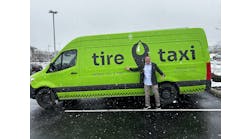ESOPs, Buyouts, Trusts or Debt Recap: A Look at Alternative Exit Strategies
Many tire dealers are fortunate in having children who work in their business and plan to take over when they retire.
I run across second generation tire dealerships all the time, and occasionally find a third generation still running the business. But sometimes that second generation wants neither the burden of ownership nor the debt that the parent is expecting the kid to take on to buy them out.
That’s when a tire dealer needs to start examining alternative exit options.
If the decision is made to bypass family and go outside, a strategic sale or a private equity recapitalization may be options for some tire dealers, if their business is attractive enough. If so, this usually results in the biggest payday.
But not every tire dealer has those big payday options and not every tire dealer is motivated solely by a big payday. For some, rewarding employees, taking care of the management team or giving to charity are more important.
Everyone is different and like my mom used to say, “If everyone was the same, the world would be a boring place.”
Here are some of the most common alternatives:
Employee Stock Ownership Plans (ESOPs) are employee benefit plans originally created to motivate and reward employees. They are now primarily used by private business owners to exit their businesses. While ESOPs are highly regulated entities, there are significant tax advantages to an ESOP.
First, an ESOP can borrow money from banks and other lenders to buy out the owner, who can then take advantage of certain tax deferrals by reinvesting the proceeds into more liquid and marketable securities.
Second, the ESOP can use its pre-tax earnings to pay off principal and interest, both of which are tax deductible, eventually paying off the loan or loans.
Lastly, a business owned by an ESOP can effectively pay no federal or state income taxes on the profits of the business by contributing cash into the ESOP annually.
The investment bank I’m with became an ESOP two years ago in order to buy out our majority shareholders. Our primary motivation was not money. We simply liked our independence, how we were set up and how the business meshed with our lifestyles. We did not want those to change.
ESOPs are not without expense to set up and maintain. They cost about $75,000 initially to set up, not including bank fees, and ongoing expenses are about $35,000 per year.
Management buyouts happen when an owner wants to sell to the management team that is already running the business.
The great thing about having key managers buy the business is that you bypass the exhaustive due diligence process that accompanies an outside sale process. The transaction becomes an exercise in negotiating the price with the selling owner and then figuring out how to pay for it.
It’s important that the management team contributes some equity into the deal to have some skin in the game.
For the balance, most management buyouts incorporate leverage of some kind. Larger transactions may involve senior bank debt, mezzanine debt and sometimes private equity. Smaller companies get bank loans along with seller notes receivable.
Charitable trusts can be used to shield against capital gains taxes, get an income stream for life and give to charity. An owner can donate a business to a charitable remainder trust and get a tax deduction that can be used to offset a capital gain on something like the sale of the real estate of that business.
Once inside the trust, the business can be sold and no tax is paid on the sale of that business. Then the owner gets an annual distribution from the charitable trust, with 5% of the trust’s assets distributed annually being the typical minimum.
In a debt recapitalization, you simply go out and load up the business on debt and use it on yourself.
Most business acquisitions involve debt. Senior bank debt can be as much as 60% of a buyer’s capital structure, mezzanine debt can make up another 20 % and equity from the buyer makes up the last 20 %. But I’ve been involved in a private equity deal where all of the purchase price was sourced in debt. The private equity buyer didn’t put up a penny.
Not all businesses transfer to the next generation of owners and not all businesses will find a strategic or private equity buyer. Understanding the alternative exit options and planning years in advance will contribute towards having a successful outcome.
Michael McGregor is a partner at Focus Investment Banking LLC (focusbankers.com/automotive/tire-and-service). He advises and assists multi-location tire dealers on mergers and acquisitions. For more information, contact him at [email protected].

